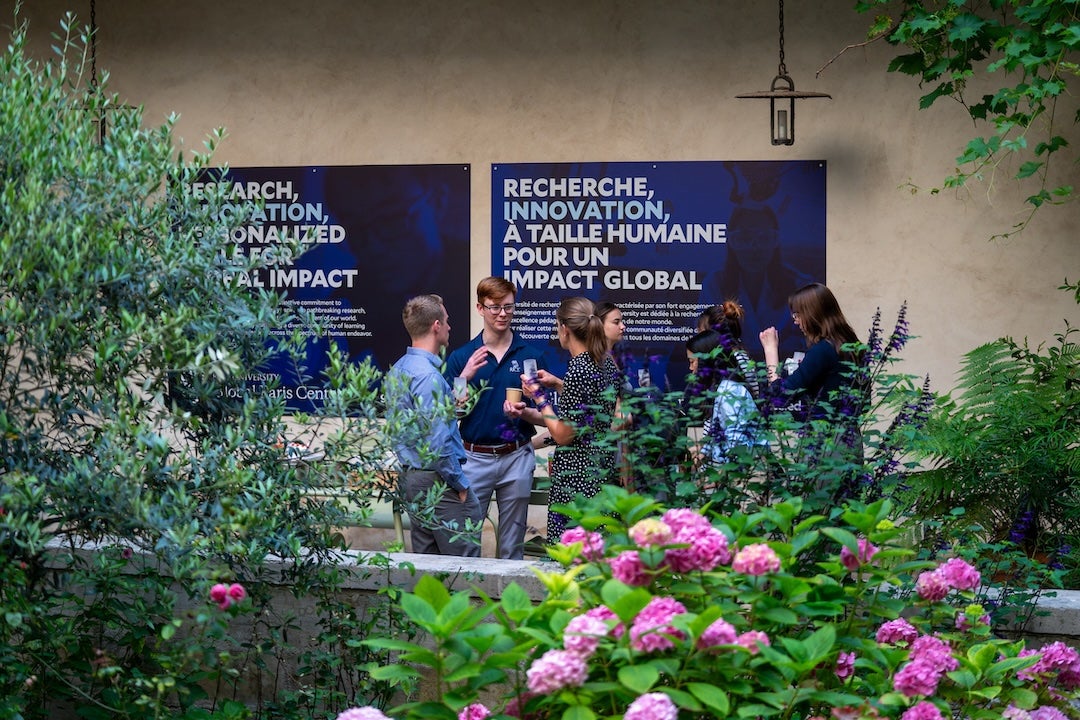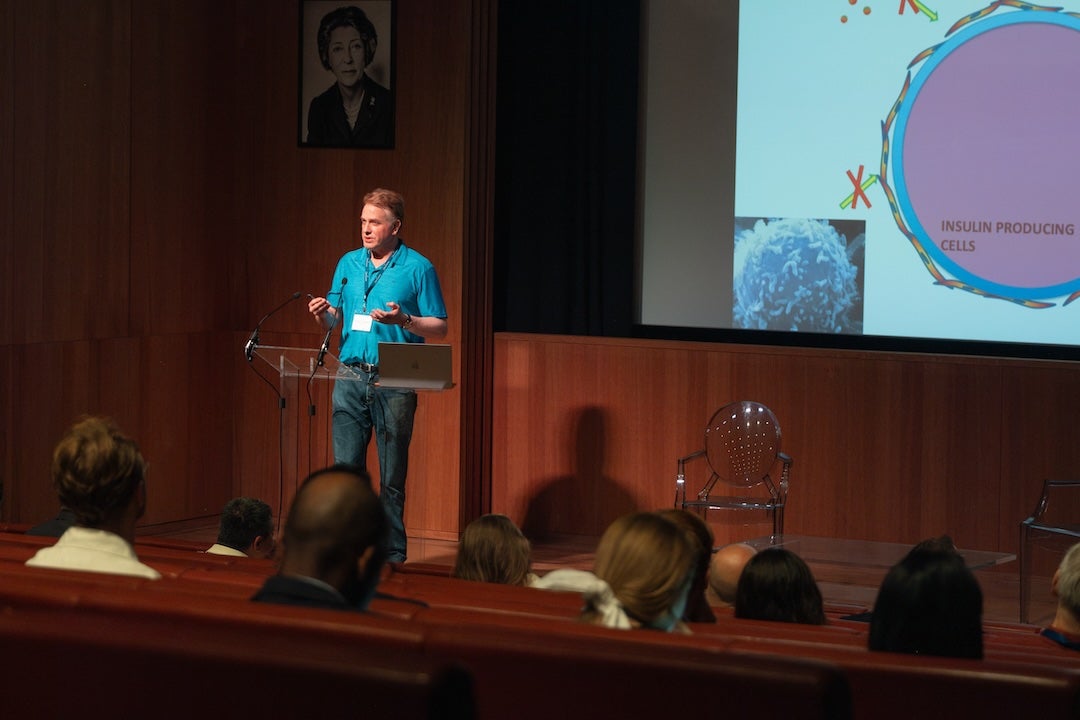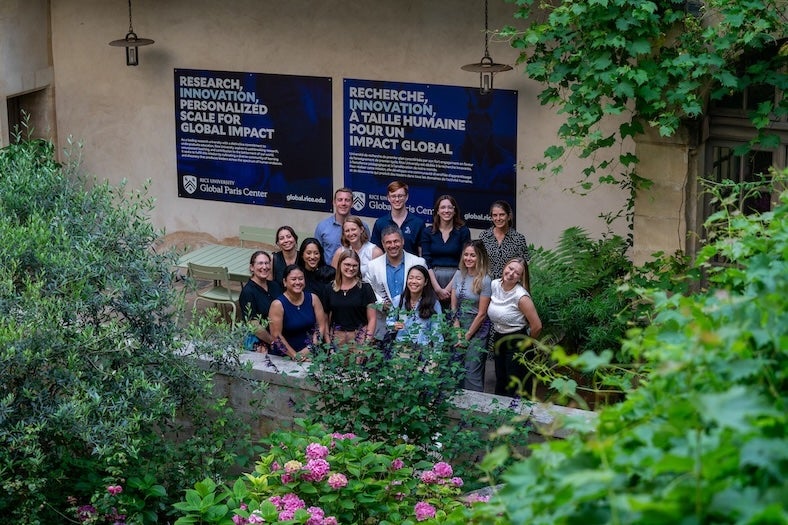The Rice Global Paris Center hosted the BioElectronic Therapeutics (BETx) conference and workshop June 27-28, the first formal event dedicated to the field of bioelectronics to be held at Rice University’s Paris campus.
Organized by Rice bioengineers Omid Veiseh and Jacob Robinson along with Northwestern University’s Johnathan Rivnay, the event brought together a diverse group of leaders from academia, industry, venture capital, foundations and government. This convergence aimed to foster discussions on the rapidly evolving field of bioelectronics with the ultimate goal of accelerating technological advancements and improving patient care.
“Bioelectronics is a multidisciplinary arena for research and innovation that aims to develop transformative diagnostic and therapeutic health care tools through the integration of the living body with electronic systems,” said Veiseh, a professor of bioengineering and a Cancer Prevention and Research Institute of Texas Scholar whose research seeks to overcome challenges to the medical use of implanted biomaterials and devices.


BETx was sponsored by the Rice Biotech Launch Pad, an accelerator dedicated to bridging the gap between innovative research and clinical application. Veiseh, who serves as faculty director of the Houston-based accelerator, said bioelectronics “have the potential to transform patient care and revolutionize the biotech industry.”
“We brought together leading clinicians, patient advocates and industry leaders to think about how to best accelerate the advancement of these technologies with a view to the greatest human impact,” he added.
Robinson, a professor of electrical and computer engineering and bioengineering at Rice whose work focuses on the development of nanotechnologies for monitoring and controlling target cell populations in the nervous system, said the growth of the field has created a need for research and business practitioners to establish better and more diverse platforms for interaction.
“Bioelectronics is at the forefront of a paradigm shift in medical practice towards personalized care and increased patient autonomy, and our goal in our work and with events like BETx is to sustain momentum and create more room for collaboration,” said Robinson, founder and CEO of Motif Neurotech, which has developed a minimally invasive miniature brain stimulator for treating drug-resistant neurological and psychiatric disorders.


The event featured talks on a range of topics crucial to the bioelectronics field, including market-driven innovations in therapeutics, clinician needs, bioelectronic integration, bioengineering cell-based therapeutics and the funding landscape in bioelectronics and neurotechnology. In addition to formal presentations, BETx staged opportunities for interaction and open dialogue through a series of discussions, a poster session and a career panel.
“At Rice University, we train our Ph.D. students to be the future leaders in these industries,” Veiseh said, underscoring the importance of events like BETx for professional growth. “Bringing [graduate students] here to network with current leaders and discuss their ideas is essential. Events like this provide a well-rounded educational opportunity, helping them understand what the market needs to build solutions that will transform patients’ lives.”
Matthew Parker, an electrical engineering graduate student in the Robinson lab, said events like BETx are important for forging community and providing an opportunity for direct, face-to-face exchange of ideas.


Lizzy Kelley, a bioengineering graduate student in the Veiseh lab, echoed this sentiment, noting the unique opportunity to engage with leading figures in the field.
“For grad students, being able to come out here and meet really interesting people is an unbelievable opportunity,” Kelley said, adding that the Rice Global Paris Center, situated in the historic Marais district, helped enhance the experience.
“I can’t even explain how cool it is here,” she said.
Nathan Brown, another graduate student from Veiseh’s lab, highlighted the interdisciplinary nature of bioelectronics and the importance of “connecting with other graduate students, professors, industry professionals and investors.”
“Bioelectronics is such a novel and important space, and understanding the challenges from different perspectives is crucial,” Brown said.
- Video is available at:
-
https://www.youtube.com/watch?v=f2EpII6RTtk
(Video by Brandon Martin/Rice University) - Image downloads:
-
https://news-network.rice.edu/news/files/2024/07/240626_BETx-BioElectronic-Therapeutics-in-Paris_martin-56-1.jpg
(Photo by Brandon Martin/Rice University)
https://news-network.rice.edu/news/files/2024/07/240626_BETx-BioElectronic-Therapeutics-in-Paris_martin-38.jpg
(Photo by Brandon Martin/Rice University)
https://news-network.rice.edu/news/files/2024/07/240626_BETx-BioElectronic-Therapeutics-in-Paris_martin-144.jpg
(Photo by Brandon Martin/Rice University)
https://news-network.rice.edu/news/files/2024/07/240626_BETx-BioElectronic-Therapeutics-in-Paris_martin-128.jpg
(Photo by Brandon Martin/Rice University)
https://news-network.rice.edu/news/files/2024/07/240626_BETx-BioElectronic-Therapeutics-in-Paris_martin-168.jpg
(Photo by Brandon Martin/Rice University)https://news-network.rice.edu/news/files/2024/07/240627_BETx-Paris_Martin-13.jpg
(Photo by Brandon Martin/Rice University)
https://news-network.rice.edu/news/files/2024/07/240627_BETx_Fitlow_033.jpg
(Photo by Jeff Fitlow/Rice University)
https://news-network.rice.edu/news/files/2024/07/240627_BETx_Fitlow_040.jpg
(Photo by Jeff Fitlow/Rice University)

